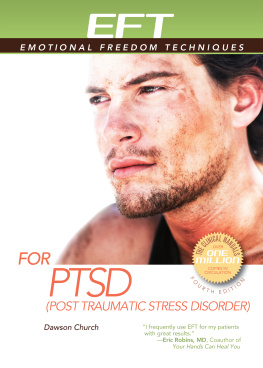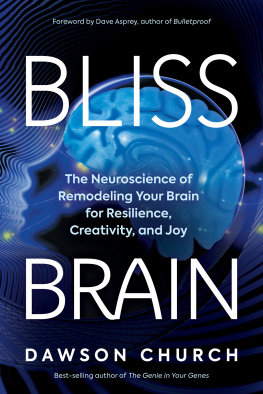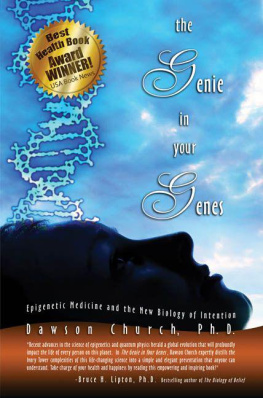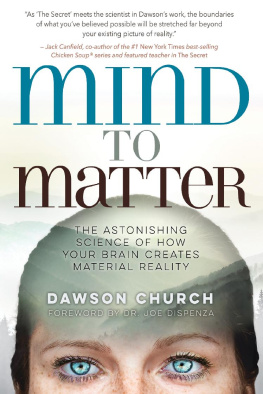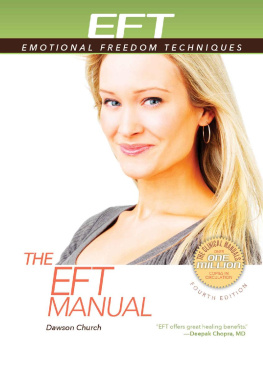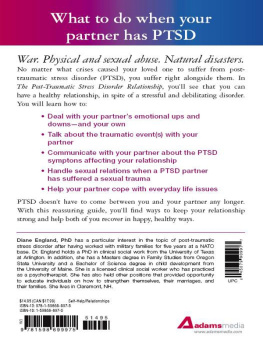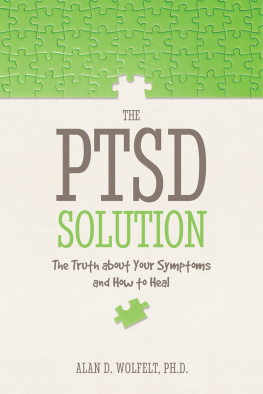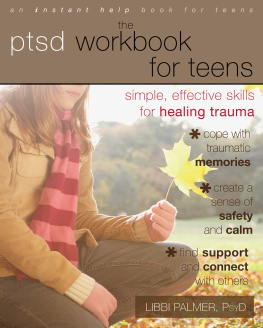Energy Psychology Press
3340 Fulton Rd., #442, Fulton, CA 95439
www.EFTUniverse.com
Cataloging-in-Publication Data
Church, Dawson, 1956
EFT for PTSD / Dawson Church. 4th ed.
p. cm.
Includes bibliographical references and index.
ISBN (print) 978-1-60415-216-6; (e-book) 978-1-60415-266-1
1. Posttraumatic stress disorderTreatment. I. Title.
RC552.P67C73 2008
616.85'2106dc22
2008046923
2017 Dawson Church
This book demonstrates an impressive personal improvement tool. It is not a substitute for training in psychology or psychotherapy. The author urges the reader to use these techniques under the supervision of a qualified therapist or physician. The author and publisher do not assume responsibility for how the reader chooses to apply the techniques herein. The ideas, procedures, and suggestions in this book are not intended as a substitute for consultation with your professional health care provider. If you have any questions about whether or not to use EFT, consult your physician or licensed mental health practitioner. The information in this book is of a general nature only, and may not be used to treat or diagnose any particular disease or any particular person. Reading this book does not constitute a professional relationship or professional advice or services. No endorsement or warranty is explicit or implied by any entity connected to this book, and there is no guarantee that you will have the same results.
All rights reserved. No part of this publication may be reproduced, stored in a retrieval system, or transmitted in any form or by any means, electronic, mechanical, photocopy, recording, or otherwise, without prior written permission from Energy Psychology Press, with the exception of short excerpts used with acknowledgment of publisher and author.
Cover design by Victoria Valentine
Editing by Stephanie Marohn
Typesetting by Karin Kinsey
Typeset in Cochin and Adobe Garamond
Printed in USA by Bang Printing
Fourth Edition
10 9 8 7 6 5 4 3 2 1
Important note: While EFT (Emotional Freedom Techniques) has produced remarkable clinical results, it must still be considered to be in the experimental stage and thus practitioners and the public must take complete responsibility for their use of it. Further, Dawson Church is not a licensed health professional and offers the information in this book solely as a life coach. Readers are strongly cautioned and advised to consult with a physician, psychologist, psychiatrist, or other licensed health care professional before utilizing any of the information in this book. The information is based on information from sources believed to be accurate and reliable and every reasonable effort has been made to make the information as complete and accurate as possible, but such completeness and accuracy cannot be guaranteed and is not guaranteed.
The author, publisher, and contributors to this book, and their successors, assigns, licensees, employees, officers, directors, attorneys, agents, and other parties related to them (a) do not make any representations, warranties, or guarantees that any of the information will produce any particular medical, psychological, physical, or emotional result; (b) are not engaged in the rendering of medical, psychological or other advice or services; (c) do not provide diagnosis, care, treatment, or rehabilitation of any individual; and (d) do not necessarily share the views and opinions expressed in the information. The information has not undergone evaluation and testing by the United States Food and Drug Administration or similar agency of any other country and is not intended to diagnose, treat, prevent, mitigate, or cure any disease. Risks that might be determined by such testing are unknown. If the reader purchases any services or products as a result of the information, the reader or user acknowledges that the reader or user has done so with informed consent. The information is provided on an as is basis without any warranties of any kind, express or implied, whether warranties as to use, merchantability, fitness for a particular purpose, or otherwise.
The author, publisher, and contributors to this book, and their successors, assigns, licensees, employees, officers, directors, attorneys, agents, and other parties related to them (a) expressly disclaim any liability for and shall not be liable for any loss or damage including but not limited to use of the information; (b) shall not be liable for any direct or indirect compensatory, special, incidental, or consequential damages or costs of any kind or character; (c) shall not be responsible for any acts or omissions by any party including but not limited to any party mentioned or included in the information or otherwise; (d) do not endorse or support any material or information from any party mentioned or included in the information or otherwise; and (e) will not be liable for damages or costs resulting from any claim whatsoever. The within limitation of warranties may be limited by the laws of certain states and/or other jurisdictions and so some of the foregoing limitations may not apply to the reader who may have other rights that vary from state to state. If the reader or user does not agree with any of the terms of the foregoing, the reader or user should not use the information in this book or read it. A reader who continues reading this book will be deemed to have accepted the provisions of this disclaimer.
Please consult qualified health practitioners regarding your use of EFT.
Contents
If youre reading this book, its for one of three reasons.
- You have been diagnosed with posttraumatic stress disorder (PTSD) or you suspect you might have PTSD.
- A family member of yours has PTSD. Perhaps your husband, wife, daughter, or son is a veteran with PSTD. Perhaps a family member has PTSD as the result of a car crash, assault, or some other traumatic event. Perhaps you suspect the erratic behavior of your spouse is due to childhood abuse. Youre motivated to find out more and to help a loved one.
- You work with people who have PTSD.
No one picks up a book called EFT for PTSD for light recreational reading. I know you need answers, and Im here to give them to you. This book gets right to the point. It summarizes the work of the worlds top experts in PTSD and EFT. Im going to tell you, bluntly and frankly, whats possible and whats not. Im going to lay out why PTSD is such an insidious disease, why it gets worse over time without proper treatment, how it devastates families, marriages, and communities, and what sort of changes you can realistically expect if you learn and practice EFT.
This book was also written to give you hope. A huge amount of time went in to writing it, into inviting top people in their fields to share their expertise, and into soliciting stories from members of the EFT community about their direct experiences with PTSD. All these people contributed because they want to give hope to those who suffer from PTSD.
You need hope when youre dealing with PTSD. As well discover together in the coming chapters, PTSD is a devastating condition. Its not just bad for the person diagnosed. It affects brothers, sisters, husbands, wives, sons, and daughters. Its effects spread out to the whole community (McFarlane & van der Kolk, 2007).
PTSD often becomes worse over time. The reason for this is that it changes the brain. The parts of the brain responsible for learning and happiness actually shrink, while cognitive function and memory degrade (Peters et al., 2010; Hedges & Woon, 2010; Felmingham et al., 2009). A veteran may show no symptoms for a year or two after returning from combat but then develop PTSD. Family members of Vietnam veterans often notice them getting worse 30 or 40 years later. All those years of building up the neural circuitry of stress increases its efficiency, while those parts of the brain responsible for learning and memory wither away. Its not a pretty picture in the long term, and its a problem that does not go away if you ignore it.

